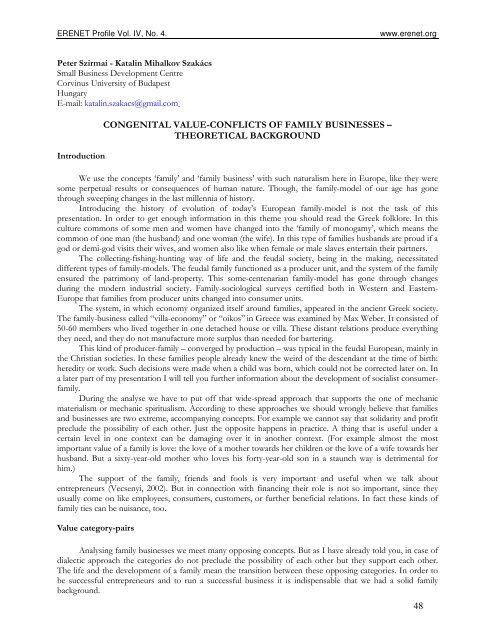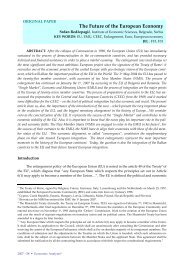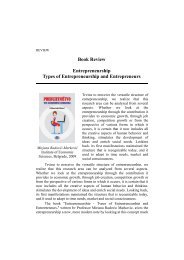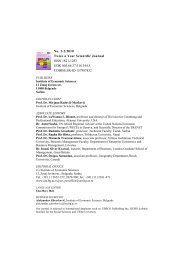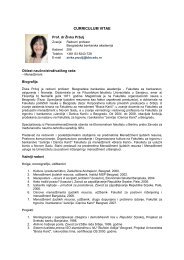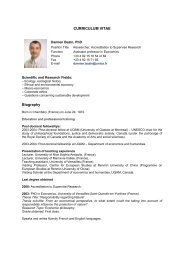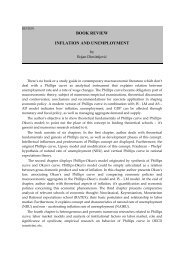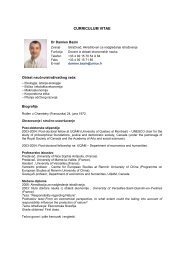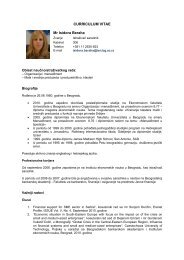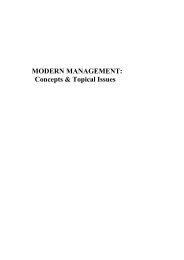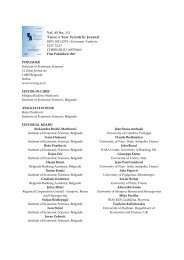Issue 16
Issue 16
Issue 16
You also want an ePaper? Increase the reach of your titles
YUMPU automatically turns print PDFs into web optimized ePapers that Google loves.
ERENET Profile Vol. IV, No. 4.<br />
www.erenet.org<br />
Peter Szirmai - Katalin Mihalkov Szakács<br />
Small Business Development Centre<br />
Corvinus University of Budapest<br />
Hungary<br />
E-mail: katalin.szakacs@gmail.com<br />
Introduction<br />
CONGENITAL VALUE-CONFLICTS OF FAMILY BUSINESSES –<br />
THEORETICAL BACKGROUND<br />
We use the concepts ‘family’ and ‘family business’ with such naturalism here in Europe, like they were<br />
some perpetual results or consequences of human nature. Though, the family-model of our age has gone<br />
through sweeping changes in the last millennia of history.<br />
Introducing the history of evolution of today’s European family-model is not the task of this<br />
presentation. In order to get enough information in this theme you should read the Greek folklore. In this<br />
culture commons of some men and women have changed into the ‘family of monogamy’, which means the<br />
common of one man (the husband) and one woman (the wife). In this type of families husbands are proud if a<br />
god or demi-god visits their wives, and women also like when female or male slaves entertain their partners.<br />
The collecting-fishing-hunting way of life and the feudal society, being in the making, necessitated<br />
different types of family-models. The feudal family functioned as a producer unit, and the system of the family<br />
ensured the patrimony of land-property. This some-centenarian family-model has gone through changes<br />
during the modern industrial society. Family-sociological surveys certified both in Western and Eastern-<br />
Europe that families from producer units changed into consumer units.<br />
The system, in which economy organized itself around families, appeared in the ancient Greek society.<br />
The family-business called “villa-economy” or “oikos” in Greece was examined by Max Weber. It consisted of<br />
50-60 members who lived together in one detached house or villa. These distant relations produce everything<br />
they need, and they do not manufacture more surplus than needed for bartering.<br />
This kind of producer-family – converged by production – was typical in the feudal European, mainly in<br />
the Christian societies. In these families people already knew the weird of the descendant at the time of birth:<br />
heredity or work. Such decisions were made when a child was born, which could not be corrected later on. In<br />
a later part of my presentation I will tell you further information about the development of socialist consumerfamily.<br />
During the analyse we have to put off that wide-spread approach that supports the one of mechanic<br />
materialism or mechanic spiritualism. According to these approaches we should wrongly believe that families<br />
and businesses are two extreme, accompanying concepts. For example we cannot say that solidarity and profit<br />
preclude the possibility of each other. Just the opposite happens in practice. A thing that is useful under a<br />
certain level in one context can be damaging over it in another context. (For example almost the most<br />
important value of a family is love: the love of a mother towards her children or the love of a wife towards her<br />
husband. But a sixty-year-old mother who loves his forty-year-old son in a staunch way is detrimental for<br />
him.)<br />
The support of the family, friends and fools is very important and useful when we talk about<br />
entrepreneurs (Vecsenyi, 2002). But in connection with financing their role is not so important, since they<br />
usually come on like employees, consumers, customers, or further beneficial relations. In fact these kinds of<br />
family ties can be nuisance, too.<br />
Value category-pairs<br />
Analysing family businesses we meet many opposing concepts. But as I have already told you, in case of<br />
dialectic approach the categories do not preclude the possibility of each other but they support each other.<br />
The life and the development of a family mean the transition between these opposing categories. In order to<br />
be successful entrepreneurs and to run a successful business it is indispensable that we had a solid family<br />
background.<br />
48


